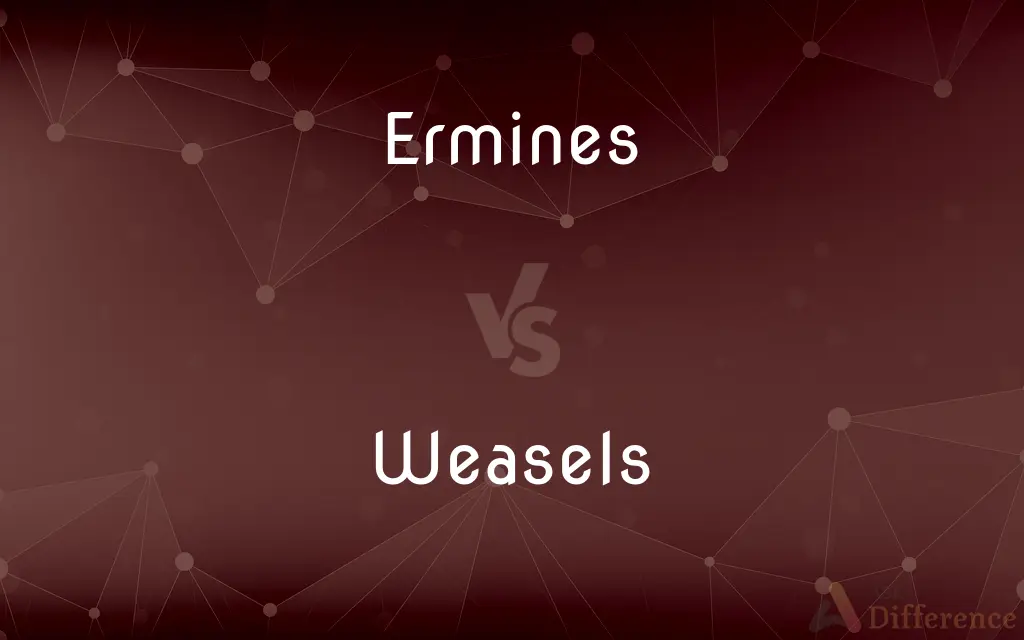Ermines vs. Weasels — What's the Difference?
By Tayyaba Rehman — Published on December 15, 2023
Ermines are a specific species of weasel known for their white winter fur; weasels are a family of slender, carnivorous mammals.

Difference Between Ermines and Weasels
Table of Contents
ADVERTISEMENT
Key Differences
Ermines, also known as stoats or short-tailed weasels, belong to the weasel family and are specifically the species Mustela erminea. Weasels, on the other hand, encompass a broader category of carnivorous mammals within the genus Mustela, which includes various species.
Ermines are renowned for their color-changing fur, which turns white in winter except for the black tail tip. Weasels also have slender bodies and sharp features, but not all weasel species have the ability to change fur color as the ermine does.
Ermines are found in North America, Europe, and Asia, adapting to both woodland and open terrain. Weasels, being a broader category, have a wider distribution and can be found in various habitats across many parts of the world.
Both ermines and weasels are carnivorous and are known for their tenacity in hunting. While ermines often hunt larger prey relative to their size, all weasels are efficient predators, feeding on small mammals, birds, and insects.
The fur of ermines, especially in their white winter phase, has historically been used in royal garments, symbolizing purity and nobility. Weasels, in general, don't have the same level of cultural or symbolic importance, though they are sometimes associated with cunning in folklore.
ADVERTISEMENT
Comparison Chart
Classification
Species within the weasel family (Mustela erminea).
Genus of carnivorous mammals (Mustela).
Appearance
White winter fur with a black tail tip.
Slender bodies; fur color varies by species.
Habitat
North America, Europe, Asia; woodland and open terrain.
Varied habitats worldwide.
Predatory Behavior
Hunts larger prey relative to size.
Efficient predators of small mammals, birds, insects.
Cultural Significance
Fur symbolizes purity, used in royal garments.
Associated with cunning in folklore.
Compare with Definitions
Ermines
Also called stoats or short-tailed weasels in different regions.
In some areas, people refer to ermines as stoats.
Weasels
A small slender carnivorous mammal from the genus Mustela.
Weasels are known for their sharp features and agility.
Ermines
A species of weasel with a white winter coat.
The ermines transformed into their snowy white coats as winter approached.
Weasels
Predators efficient at hunting small animals.
Weasels often feed on rodents and birds.
Ermines
The winter fur of this weasel, used historically in royal garments.
The royal robe was adorned with ermines.
Weasels
Mammals with a long body and short legs.
The weasel swiftly moved through the grass with its long body.
Ermines
A carnivorous mammal known for its agile hunting.
Ermines are formidable hunters despite their small size.
Weasels
Sometimes used to describe a sneaky or deceitful person.
Don't trust him; he's a weasel.
Ermines
A symbol of purity and nobility in various cultures.
Ermines were often used in heraldry due to their symbolic significance.
Weasels
Can be found in various habitats across different continents.
Weasels have adapted to environments ranging from woods to grasslands.
Ermines
A weasel (Mustela erminea) native to northern regions, having a black-tipped tail and dark brown fur that in winter changes to white. Also called stoat.
Weasels
Any of various carnivorous mammals of the genus Mustela, having a long slender body, a long tail, short legs, and brownish fur that in many species turns white in winter.
Ermines
The commercially valuable white fur of this animal.
Weasels
A person regarded as sneaky or treacherous.
Ermines
(tincture): In blazon, coloured with a heraldic fur of a black field with white spots; counter-ermine.
Weasels
To be evasive; equivocate.
Ermines
Infl of ermine
Weasels
Plural of weasel
Weasels
Infl of weasel
Common Curiosities
What's special about ermine fur?
Ermines have white winter fur with a black tail tip, historically valued in royal attire.
Are ermines and weasels the same?
No, ermines are a specific species of weasel.
Are all weasels capable of changing fur color?
No, only certain species like the ermine can change fur color with seasons.
Is it legal to keep ermines as pets?
Laws vary by region, but generally, ermines are wild animals and not typically kept as pets.
How can you differentiate between an ermine and a weasel in the wild?
Look for specific traits like the ermine's winter white coat with a black tail tip.
Why are ermines associated with royalty?
Ermine fur, especially in its white winter phase, was used in royal garments, symbolizing purity and nobility.
Where can I find ermines in the wild?
Ermines are found in North America, Europe, and Asia, in both woodlands and open terrains.
Do weasels hibernate?
No, weasels remain active throughout the year.
Which is bigger, an ermine or a weasel?
"Weasel" is a general term, so size varies by species. Some weasels are larger than ermines, and some are smaller.
Do all weasels have the same fur color?
No, fur color varies among weasel species.
Is "stoat" another name for ermine?
Yes, "stoat" and "short-tailed weasel" are other names for ermines.
Are both ermines and weasels carnivorous?
Yes, both are efficient predators.
Why are weasels sometimes called deceitful in folklore?
Their cunning hunting techniques have led to such associations in folklore and stories.
Are ermines endangered?
Ermine populations are stable in many regions, but it's always best to consult specific regional data.
Are ermines domesticated like ferrets?
No, while both belong to the weasel family, ferrets are domesticated, and ermines are wild animals.
Share Your Discovery

Previous Comparison
Ribeye vs. Delmonico
Next Comparison
Charlie Chaplin vs. Buster KeatonAuthor Spotlight
Written by
Tayyaba RehmanTayyaba Rehman is a distinguished writer, currently serving as a primary contributor to askdifference.com. As a researcher in semantics and etymology, Tayyaba's passion for the complexity of languages and their distinctions has found a perfect home on the platform. Tayyaba delves into the intricacies of language, distinguishing between commonly confused words and phrases, thereby providing clarity for readers worldwide.












































